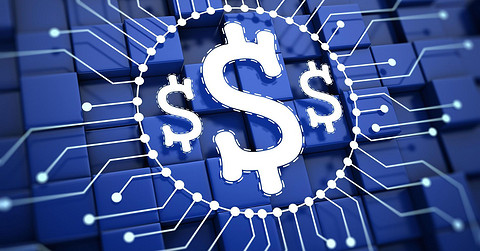Fatal flaw "double payment", cryptocurrency can never become a real currency|
The "fundamental flaw" inherent in cryptocurrencies is that when demand for it falls, the supply doesn't usually decrease with it, UBS chief economist Paul Donovan said in a video recently. This means that cryptocurrencies may never function as actual money, so they cannot be considered real money, he said.
Donovan explained that a "qualified currency" can be used as a stable store of value, that is, they can ensure that tomorrow the same basket of goods can be purchased as today, because the central bank can reduce the supply when the demand for money falls , thereby supporting its price. But most cryptocurrencies have no mechanism to stop supply, so when demand falls, their value falls, causing a collapse in purchasing power.
“When people are absolutely not sure what they can buy with something tomorrow, they don’t think of it as money,” Donovan said.
On the Chicago Mercantile Exchange, bitcoin futures are listed alongside contracts for most major currencies, but the difference in daily trading volumes suggests some investors have yet to see bitcoin as a full-fledged currency. When the price of bitcoin plunged 11% on Thursday, January bitcoin futures traded at just over $13,000, while Japanese yen futures traded about six times that amount.
In addition, cryptocurrency has a fatal flaw that prevents it from becoming a real currency. That's the problem with "double spending". Double spending occurs when the same token is used in two payments. It's like someone who buys a car, pays the seller and drives away, but he gets his money back and buys another car.
This problem does not exist in the physical currency world. For example, gold, once you spend it, it becomes the property of the next person, and you cannot reuse it for trading. The same is true for paper money, and paper money has its complex anti-counterfeiting technology, few people can crack and copy counterfeit money, so its security is relatively high.

But in the digital currency world, cryptocurrencies are easily copied or spent twice. This is because the nature of cryptocurrency itself determines that it does not require any central authority to support or supervise its transactions, so it is not the banking system that processes electronic transfers, but the blockchain.
The blockchain is essentially a shared database that records when and where bitcoins are transferred. In the transaction of encrypted currency, the transaction is generally verified by an unrelated third party, and then the entrusted transaction is carried out in the blockchain, and the currency can be exchanged.
The blockchain has its ledger technology. The ledger refers to a database that is independently saved and updated by each participant in a large network. The encrypted currency after the transaction will enter the ledger. Plus, buyers often have to confirm six times before making a payment. In the case of "double spending", it means that the blockchain has been manipulated, and the cryptocurrency is only verified once and entered into the ledger, which is then revoked and used for the next transaction.
But Nic Carter, co-founder of the data firm Coin Metrics, said that few people pay immediately after confirmation once, so it is more likely that there are two blocks with the same funds for transactions, but one of them is reversed at the end. trade.
The potential impact of blockchain is currently under intense scrutiny, with Google searches for "double spending in bitcoin" surging. But Nic Carter believes that the problem of "double spending" is "not terrible":
"To me, it doesn't mean the buyer is being scammed. I'm more inclined to think it's a technical or software bug."
Andreas Antonopoulos, an expert on Bitcoin and blockchain open technology, also said:
“The Bitcoin blockchain works exactly as designed and has been doing so for a full 12 years. What we are seeing today is a block reorganization. These operations occur on average every two weeks and are a normal part of the consensus algorithm.”
Mark Cudmore also said that the blockchain technology has never been destroyed, but the transaction confirmation process with a long time span of cryptocurrency makes it possible for some people to "double pay":
“This is why multiple block confirmations are a design feature of cryptocurrencies, not a bug. People who use single block confirmations tend to ignore this, six block confirmations are safe.”
bitcoinbitcoinThe speed of transactions, and to some extent weakened its possibility of becoming a major currency.
Mark Cudmore said that if people just buy Bitcoin purely, then the multi-confirmation operation will have little impact; but if people regard Bitcoin as the future currency, the impact will be great, but the latter is only a minority at present.




